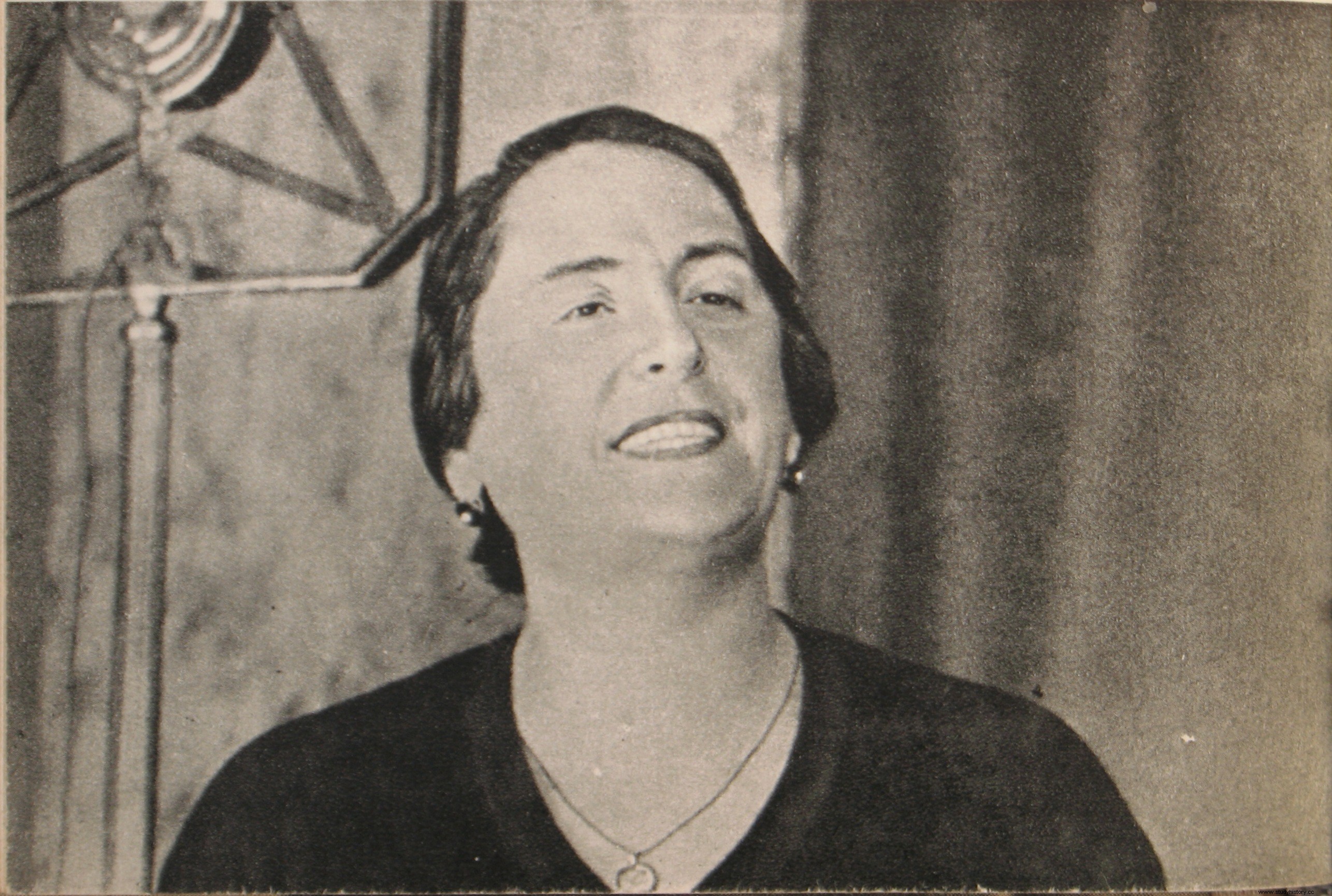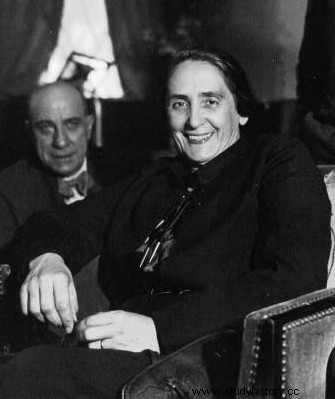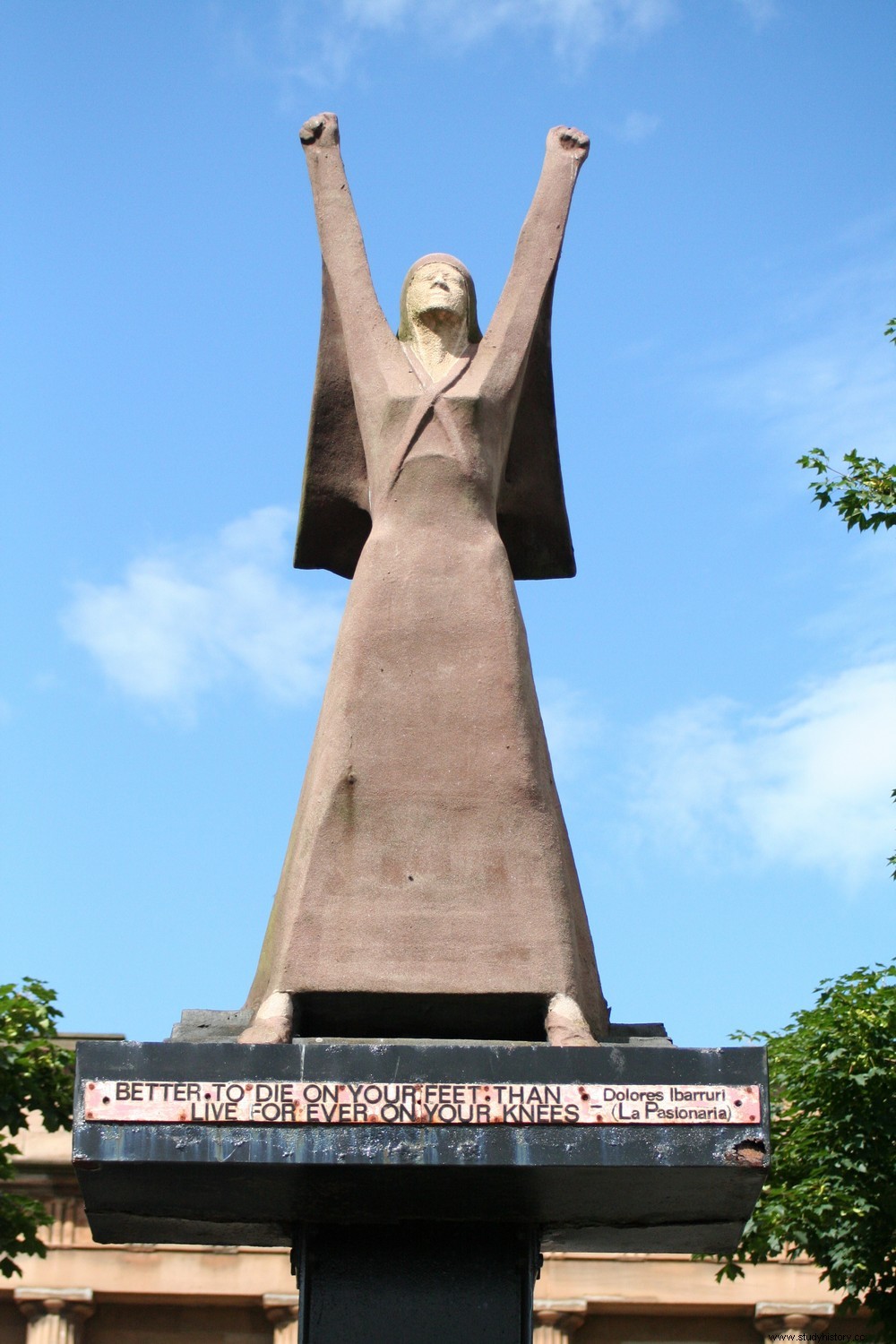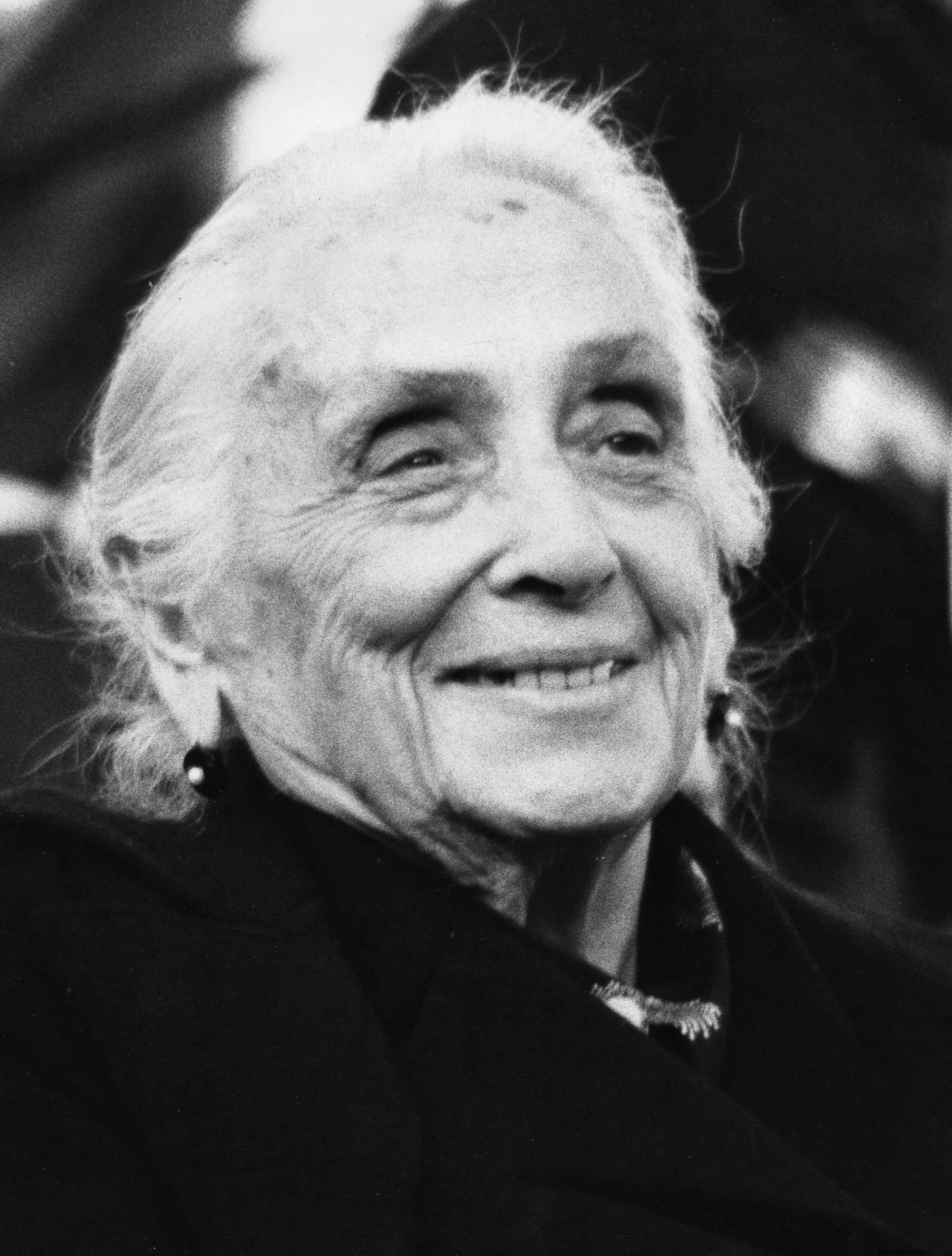Dolores Ibarruri Gómez , known as La Pasionaria (1895 – 1989), was an activist, a politician and an emblematic figure of the Spanish Civil War. She is known for her famous slogan ¡No Pasarán!, used by the Republicans against the Nationalists.
A broken vocation
 Eighth of eleven children, Dolores Ibárruri was born on December 9, 1895 in the mining town of Gallarta, near Bilbao. His mother, Juliana Gómez Pardo, is of Castilian descent; his father, Antonio Ibárruri, is a Basque miner. Antonio is Catholic and militant Carlist.
Eighth of eleven children, Dolores Ibárruri was born on December 9, 1895 in the mining town of Gallarta, near Bilbao. His mother, Juliana Gómez Pardo, is of Castilian descent; his father, Antonio Ibárruri, is a Basque miner. Antonio is Catholic and militant Carlist.
Encouraged by her teacher, Dolores dreams of becoming a teacher and devours the books that are lent to her. But her parents do not have the means to pay for her studies and the young girl has to give up her dream at the age of fifteen. She started learning sewing before becoming a housekeeper.
La Passionaria
Dolores Ibárruri meets Julián Ruiz, a miner and socialist activist, whom she marries in 1916; they will have six children, including triplets. Only two will reach adulthood. The following year, the couple participates in the general strike movement of 1917, and Julián is arrested and imprisoned. It will still be on several occasions in the 1920s; between his periods of imprisonment, the death of several of their young children and a complicated financial situation, the living conditions of the Ibárruri Gómez family are particularly difficult.
Julián introduces his wife, who shares his socialist ideals, into militant circles. Dolores reads many authors, including Karl Marx, forms her political thought and is an activist in the Federation of Socialist Youth. In 1917, the Russian revolution inspired him and marked a turning point in his commitment. In 1918, Dolores wrote her first article in the labor press, in the newspaper El Minero Vizcaino; the article appearing during Holy Week and dealing in particular with religious hypocrisy, she signed it with the pseudonym La Pasionaria .
Mundo Obrero
 In 1919, she joined the Communist International before participating in the founding of the Spanish Communist Party (PCE ). She becomes a member of the provincial committee of Biscay, in which she plays an important role. After ten years of activism, she was elected to the Central Committee of the PCE in 1930. The following year, at the request of the party, Dolores Ibárruri moved to Madrid and left her husband; although separated, they will keep the bonds of friendship.
In 1919, she joined the Communist International before participating in the founding of the Spanish Communist Party (PCE ). She becomes a member of the provincial committee of Biscay, in which she plays an important role. After ten years of activism, she was elected to the Central Committee of the PCE in 1930. The following year, at the request of the party, Dolores Ibárruri moved to Madrid and left her husband; although separated, they will keep the bonds of friendship.
In Madrid, Dolores becomes responsible for the party newspaper, Mundo Obrero (working class). Noted for her articles in El Minero Vizcaino then Mundo Obrero , she was closely watched and arrested for the first time in September 1931. In prison, Dolores persuaded her fellow prisoners to start a hunger strike to protest against their conditions of detention. Imprisoned again in March 1932, she blackmailed her fellow inmates into the International and encouraged them to refuse poorly paid prison jobs.
Mujeres Antifascistas
In 1933, Dolores Ibárruri founded Mujeres Antifascistas , an association of women against fascism and war. The same year, the PCE sent her as a delegate to Moscow and this trip marked her deeply. In 1934, after the violent repression of the Asturian revolution, the Mujeres Antifascistas committee became a protection for the children of workers who had become orphans. Dolores takes great risks to smuggle the children to Madrid.
Dolores' activism no longer allows her to take proper care of her two surviving children, Rubén and Amaya, nor to ensure a stable existence for them. She then makes the decision to remove them and send them to live in the Soviet Union.
¡No Pasarán!
 In 1936, when the Popular Front won the elections, Dolores Ibárruri was elected deputy of Asturias. As soon as she was elected, she went to Oviedo where socialist, communist and republican political activists were imprisoned; after tough negotiations with the prison management, she obtains the release of the prisoners.
In 1936, when the Popular Front won the elections, Dolores Ibárruri was elected deputy of Asturias. As soon as she was elected, she went to Oviedo where socialist, communist and republican political activists were imprisoned; after tough negotiations with the prison management, she obtains the release of the prisoners.
In July 1936, when the civil war in Spain broke out, Dolores spoke at the Ministry of the Interior to defend the republic. " Workers ! Peasants! Antifascists! Spaniards! Patriots! Faced with the fascist military uprising, all standing up to defend the Republic, to defend popular freedoms and democratic conquests. The whole country vibrates with indignation at those who want to engulf Spain in a hell of terror and death. The fascists will not pass. No pasaran. »
This cry ¡No Pasarán! , pronounced with such fervor, became the official watchword, the rallying cry of the Republicans against the Nationalists. This episode will transform Dolores into an icon, a popular symbol, to the point that the myth often exceeds reality.
Exile in the Soviet Union
 Terless, Dolores Ibárruri mobilizes workers, soldiers, goes to France to meet Léon Blum, organizes a rally at the Winter Velodrome before returning to Spain to participate in the defense of the capital. She participates in committees for the defense of the republic, organizes demonstrations, strives to support the morale of Republican soldiers. Some blame her for staying behind while her husband and son Rubén returned from the Soviet Union, but Dolores' actions earned her great popularity in communist public opinion.
Terless, Dolores Ibárruri mobilizes workers, soldiers, goes to France to meet Léon Blum, organizes a rally at the Winter Velodrome before returning to Spain to participate in the defense of the capital. She participates in committees for the defense of the republic, organizes demonstrations, strives to support the morale of Republican soldiers. Some blame her for staying behind while her husband and son Rubén returned from the Soviet Union, but Dolores' actions earned her great popularity in communist public opinion.
When Franco's troops finally entered Madrid in April 1939, Dolores went into exile in the Soviet Union where she continued her militant activities. In August 1942, his son Rubén died at the front during the very bloody battle of Stalingrad. Devastated by this new tragedy, Dolores nevertheless took on the role of general secretary of the PCE, which she kept until 1960; that year, she became party president.
When Franco died in 1975, Dolores returned to Spain, where she was quickly elected deputy to the Cortes, more than forty years after her first election in 1936.
Dolores Ibárruri died on November 12, 1989, at the age of 93, of pneumonia.
